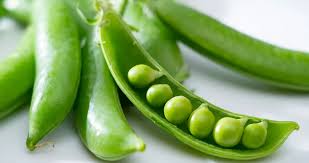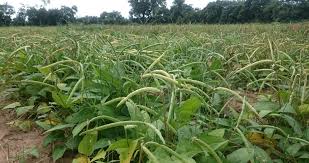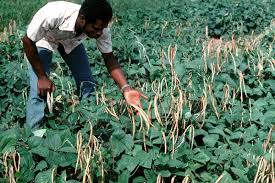![]()
If you’ve landed on this article page, you’re probably searching for a
good business idea—an idea that’s light on the pocket but heavy on
returns, promising both a fulfilling journey and potential profit.
|
How to start Pea Farming in Nigeria
Pea farming in Nigeria presents a lucrative opportunity for both
small-scale and commercial farmers. As a versatile and
nutritious crop, peas have gained popularity in recent years due
to their high protein content and various culinary applications.
Peas (Pisum sativum) are annual plants belonging to the legume
family. They are known for their edible seeds, which grow inside
pods. There are several types of peas, including:
Garden peas (also known as English peas or green peas),Snow peas
and Sugar snap peas
Each variety has its own unique characteristics and growing
requirements. In Nigeria, garden peas are the most commonly
cultivated type due to their adaptability to the country’s
climate and soil conditions.
Pea farming offers numerous advantages to Nigerian farmers:
Nutritional value: Peas are rich in protein, fibre, vitamins,
and minerals, making them a valuable addition to the Nigerian
diet.
Short growing cycle: Peas mature quickly, allowing farmers to
harvest within 60-90 days of planting.
Soil improvement: As legumes, peas fix nitrogen in the soil,
enhancing fertility for subsequent crops.
Low input costs: Peas require minimal fertilisers and pesticides
compared to many other crops.
Multiple harvests: With proper planning, farmers can achieve
multiple harvests per year.
Market demand: There is a growing demand for peas in both local
and international markets.
Climatic Requirements for Pea Farming in Nigeria
Understanding the climatic needs of peas is crucial for
successful cultivation in Nigeria.
Planting: Plant pea seeds about 4 cm deep in double rows that
are 10 x 50 cm apart.
Spacing: Peas need good spacing and warm soil to grow. During
the rainy season, you can reduce the spacing to increase air
circulation and reduce the risk of rust.
Staking: If you stake your peas, you can use twigs, short-staked
wires, or strings between the double rows.
Seed dressing: Before sowing, you can treat the seeds with Apron
XL to improve germination and protect seedlings from fungal
infection.
Crop type: Cowpeas are an annual crop that can be grown as a
shrub, vine, or pole.
Intercropping: Pigeon pea farmers often intercrop with other
crops, such as yam, millet, sorghum, or cassava.
Temperature: Peas thrive in cool temperatures between 13°C and
18°C (55°F to 65°F). They can tolerate light frost but are
sensitive to high temperatures.
Rainfall: Peas require moderate rainfall or irrigation,
typically 350–500 mm throughout their growing cycle.
Sunlight: While peas prefer full sun, they can tolerate partial
shade, especially in hotter regions of Nigeria.
Humidity: Moderate humidity levels are ideal for pea growth.
Excessive humidity can lead to fungal diseases.
In Nigeria, pea farming is most successful in the northern
states and highlands, where temperatures are cooler. However,
with proper timing and variety selection, peas can be grown in
other parts of the country as well.
Soil requirements for pea cultivation
Soil quality plays a significant role in the success of pea
farming.
Soil type: Peas prefer well-draining, loamy soils rich in
organic matter.
pH level: The ideal soil pH for peas ranges from 6.0 to 7.0.
Most Nigerian soils fall within this range, but testing is
recommended.
Soil depth: A minimum soil depth of 45 cm (18 inches) is
necessary for proper root development.
Drainage: Good drainage is essential to prevent waterlogging,
which can lead to root rot.
Fertility: While peas can fix nitrogen, they benefit from
balanced soil nutrients, especially phosphorus and potassium.
Choosing the Right Pea Variety for Nigerian Conditions
Selecting the appropriate pea variety is crucial for successful
farming in Nigeria. Consider the following factors:
Climate adaptation: Choose varieties that are well-suited to
your local climate.
Disease resistance: Opt for varieties with resistance to common
pea diseases in Nigeria.
Growth habit: Determine whether you want bush varieties or
climbing varieties that require support.
Market demand: Consider the preferences of your target market
when selecting varieties.
Some pea varieties that have shown promise in Nigeria include:
Green Arrow: A high-yielding variety with good disease
resistance.
Little Marvel: An early-maturing dwarf variety suitable for
small gardens.
Alderman: A tall, climbing variety known for its large, sweet
peas.
Onward: A reliable, mid-season variety with good yield
potential.
Land Preparation for Pea Farming
Proper land preparation is essential for successful pea
cultivation.
Clearing: Remove all weeds, rocks, and debris from the field.
Ploughing: Plough the land to a depth of 20-30 cm (8-12 inches)
to loosen the soil.
Harrowing: Use a harrow to break up large soil clumps and create
a fine seedbed.
Levelling: Ensure the field is level to promote even water
distribution.
Raised beds: In areas with heavy rainfall or poor drainage,
create raised beds to improve soil aeration and prevent
waterlogging.
Soil amendment: If necessary, incorporate organic matter or
adjust soil pH based on soil test results.
Planting Techniques for Peas in Nigeria
Follow these steps for successful pea planting:
Timing: Plant peas during the cooler months, typically from
October to February in northern Nigeria, and during the rainy
season in southern regions.
Seed treatment: Treat seeds with appropriate fungicides to
prevent soil-borne diseases.
Planting depth: Sow seeds 2-4 cm (1-2 inches) deep, depending on
soil type.
Spacing: For bush varieties, space rows 45-60 cm (18-24 inches)
apart, with 5-7 cm (2-3 inches) between plants. For climbing
varieties, increase row spacing to 75–90 cm (30–36 inches).
Seed rate: Use 60–80 kg of seeds per hectare, depending on seed
size and germination rate.
Inoculation: Consider inoculating seeds with Rhizobium bacteria
to enhance nitrogen fixation, especially in fields where peas
haven’t been grown before.
Irrigation management for pea crops
Proper irrigation is crucial for optimal pea growth and yield.
Harvest every 2-3 days to encourage continued production.
Time of day: Harvest in the cool morning hours to maintain
freshness.
Handling: Handle pods gently to prevent bruising and quality
loss.
Yield expectations: Fresh pea yields can range from 4-8 tonnes
per hectare, depending on variety and management practices.
Post-Harvest Handling and Storage
Proper post-harvest handling is crucial for maintaining pea
quality and maximising profits:
Cleaning: Remove any debris, damaged pods, or foreign materials.
Sorting and grading
Sort peas based on size, colour, and quality.
Remove any diseased or pest-damaged pods.
Cooling: Rapidly cool harvested peas to 0-2°C (32-36°F) to
maintain freshness.
Packaging: For fresh market, pack peas in ventilated containers
or mesh bags.
For processing, use clean, food-grade containers.
Storage: Store fresh peas at 0-2°C (32-36°F) with 90-95%
relative humidity.
Fresh peas can be stored for 1-2 weeks under optimal conditions.
Drying (for dried peas): Dry peas to 14-16% moisture content for
safe storage.
Pea farming in Nigeria offers significant opportunities for
farmers willing to invest time, effort, and resources into this
versatile crop. By understanding the agronomic requirements,
implementing best practices in cultivation and post-harvest
handling, and staying attuned to market demands, Nigerian
farmers can establish profitable and sustainable pea farming
enterprises.
The key to success lies in continuous learning, adapting to
changing conditions, and embracing innovations that improve
productivity and sustainability. As the demand for plant-based
proteins continues to grow globally, Nigerian pea farmers are
well-positioned to capitalise on both domestic and international
market opportunities.
Get our Practical Guide on Pea Farming in Nigeria. This
comprehensive guide will walk you through every aspect of pea
farming in Nigeria, from understanding the crop to marketing
your harvest.
|







